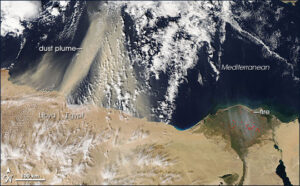
InTro team
The InTro (Interfaces et troposphère) team studies at the regional level the fine-scale physico-chemical processes and their impact on the climate.
Assessing and predicting the impact
of climate variability/change on energy systems
The energy sector is significantly affected by meteorological conditions: through the thermal sensitivity of the energy consumption (heating/cooling), the conversion of variable renewable energy (solar/wind) and damages caused by extreme events on assets. In return, most
energy sources in the world and in France being fossil fuels, energy use is the largest contribution to global warming. Many research questions thus emerge at the crossroad between climate science and energy engineering and economics. Tackling these issues is made more critical by the need to reduce the greenhouse gas emissions of the energy sector. The InTro team addresses some of these questions as part of the Energy 4 Climate (E4C) center.
Chemistry and transport of atmospheric pollutants from urban to hemispheric scales
The study of the atmospheric composition is an important research topic in the InTRo team. In particular, the team coordinates the development of the CHIMERE chemistry-transport model, which is largely used in France and abroad for research and operational air quality simulations, including the French and European forecast
platforms Prev’Air and CAMS. The main topics of research in this field include wildfire emissions with the development of the APIFLAME model, mineral dust emissions from arid areas and their subsequent transport, the transport of volcanic plumes as well as the development of downscaling techniques to address urban scale atmospheric pollution and population exposure with the EXPLUME model.
Regional climate and water cycle
Study of the Water cycle in InTRo is focused on
the Mediterranean region, in the framework of international
initiatives HyMEx and MedCORDEX. South America has become recently a new priority and builds on collaborations with the University of Buenos Aires. In the Mediterranean area, studies of the hydrological cycle and hydrological extremes (extreme precipitation, dry spells) has relied in part on the RegIPSL regional coupled modelling
platform, under development in the InTRo team in collaboration with other IPSL teams. Scientific
focuses in the team include interactions between aerosols and
precipitation, studying the water cycle of major hydrologic basins. A particular focus is the anthropogenic use of the water and areas of strong surface/atmosphere interactions like the wetlands of the Pantanal in South America. Study of the regional water cycle is one of the strong reasons why the InTRo team is currently strongly involved in the development of the
In collaboration with other teams at LMD and IPSL, the Intro team is a core contributor to the development of a new dynamical core (fluid solver) for LMDZ, the atmospheric general circulation model (GCM) part of IPSL-CM Earth
System Model. The main role of DYNAMICO is to reformulate in LMDZ the horizontal advection and dynamics on an icosahedral grid, while preserving or improving their qualities with respect to accuracy, conservation laws and wave dispersion. Efficient implementation on present and future supercomputing architectures is also a key issue addressed by DYNAMICO. A grid refinement strategy based on variable-resolution, fully unstructured meshes is under development. A broader goal is to revisit all fundamental features of the dynamical core, especially the shallow-atmosphere/traditional approximation, the vertical coordinate and the coupling with physics.
Image source: earthobservatory.nasa.gov
Image credit: NASA image courtesy Jeff Schmaltz, MODIS Rapid Response Team at NASA GSFC.



